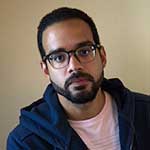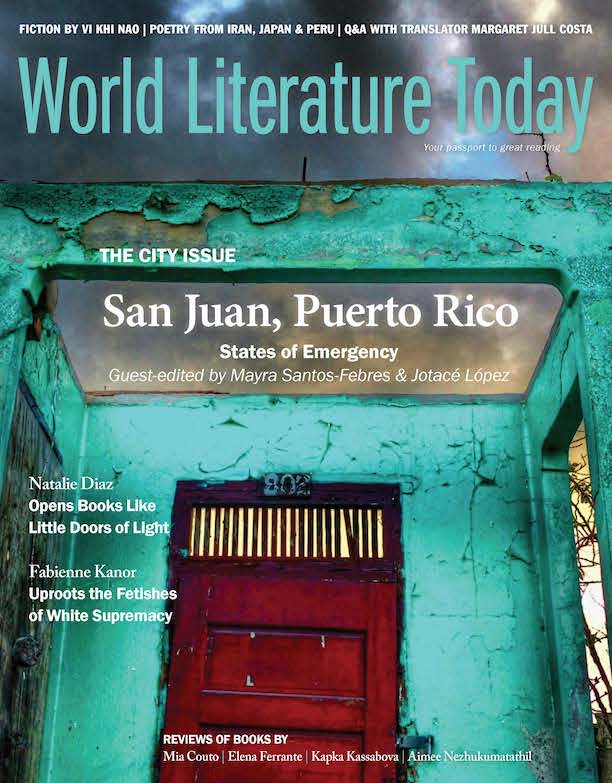The Primary Substance

Stuck in traffic during a downpour, a driver faces a peculiar dilemma.
Juan Carlos saw the man die in the car to the right, in the middle of a bumper-to-bumper traffic jam that made no sense. Despite the downpour that conspired with the heat and threatened to drown the world, he saw the man’s head bash against the foggy window. He swore he heard it, even if the only thing capable of piercing through the deafening noise of the endless vehicles and the weather was the useless and faraway whistle of an officer who had been guiding traffic in that thoroughfare since Hurricane María, two years ago.
“That guy is dying,” he said, with the hope that saying it out loud would start something. He looked through the rearview mirror at the car behind his. The woman who sat in the driver’s seat seemed not to have noticed what had happened. Her head was cocked to the side, her shoulder raised, and a phone pinched between the two while she studied her nails. In the vehicle in front of his, he could only see the heads of three kids bobbing as if on the surface of the sea.
A drop of blood crept down from the spot where the head had smashed. Juan Carlos put the car in park, unbuckled his seat belt, and leaned over the passenger’s seat so he could see better into the man’s car. The rain and the window blurred the red substance, but it was still there, visible, slowly pushing to the right like an arrow that pointed to the slumped body. From what he could see, the man was heavy, way too big for his vehicle; one of those small, yellow Toyota Celicas that were suddenly everywhere on the island at the beginning of the twenty-first century. The man’s head was caught in the gap between the driver’s side door and the headrest. His eyes were wide open and looking up at the sky, as if pleading. He was still. So, so still. It could’ve been a seizure that knocked him out, Juan Carlos told himself. If that was indeed the case, somebody had to intervene as soon as possible.
His eyes were wide open and looking up at the sky, as if pleading.
He’d seen one such seizure in the classroom of the private school where he worked a while ago. He’d been there only for a semester, replacing a social studies teacher who had died of leptospirosis, like so many others. When he was brought in, he was given minimal guidance. The principal handed him the standards and expectations of the sixth grade, based on the Department of Education’s old curriculum, and told him he was responsible for module 1, unit 4, “Change and Continuity.” His first week on the job he was expected to cover “significant contributions made to the history of world society and culture through the figures of Abraham, Moses, Nebuchadnezzar, Thales of Miletus, Socrates, Plato, Aristotle, Herodotus, Thucydides, and Jesus Christ.” The following week he had to go through Alexander the Great, Julius Caesar, Augustus Caesar, Confucius, and the Buddha. His role was basically to check off all of ancient history in ten days, two quizzes, and one exam. He was a Spanish teacher by training and barely recognized half of those names. He confessed to the principal, but she shrugged it off and told him to stick to the preprepared lesson plans and reading guides that the textbook company provided and everything would turn out well enough. If he was so inclined, he could probably find some fun stuff on YouTube to complement the lessons, she added, before leading him out of her office. Very little was being asked of him, and this would be reflected on his paycheck.
Juan Carlos divided the classroom into groups of two and told them to choose a historical figure from the list and prepare a short presentation explaining who they were and what their contribution was. Most students chose the religious figures available, and the activity became quickly redundant. Two girls, who looked and acted as if they were one—thin, short, dark-skinned, and wearing headbands with anime characters on them—were the exception and chose Thales. When it was their turn, on the fourth day, the second of the girls gave her friend her notebook, where he figured she’d written the notes. Without any preface, the other began to read, out loud and mechanically. She said that Thales was the first philosopher; that Thales believed that all things were made of forms of water, that everything was somewhere between ice, liquid, and vapor; that we are hardened water, that our emotions are water, that the earth itself is also thick water suspended over lighter water and that the whole planet floats like a buoy on the ocean of the universe and that one day Thales was walking, looking up to the clouds, and thinking of castles in the sky when he stumbled and fell down a well and drowned. Then, precisely at that moment, the other girl burst. Her head whiplashed back, and she was thrown off her desk and her whole body gave itself to spasms that twisted it in ways a body should not, and, for a moment, there was chaos in the classroom and the other students yelled and cried. Juan Carlos froze looking at the scene. He didn’t know what to do and could only stare at the girl peeling out of herself. The other girl intervened and kicked the backpacks out of her friend’s way, ordered her classmates to clear the way, pushed the friend on her side, and looked at the big clock that crowned the blackboard. She counted the seconds out loud. Not a minute had gone by when the seizure stopped. The friend put the girl’s head on her lap and caressed it until the school nurse got there.
“That guy is dying,” Juan Carlos repeated again, and he forced himself to feel something, even if he’d spent the last few months incapable of doing so. He picked up his phone to dial 911, but its battery was dead. He took a deep breath, killed the engine, grabbed the umbrella, and got out. The downpour’s assault gave him a headache. He’d forgotten he was in flip-flops until he stepped onto the flooded road. The woman in the car behind his, still on her phone, looked at him confused and, when their eyes met, quickly locked all of her doors. Juan Carlos went to the guy’s car and tapped the window with his index finger. There was no answer. An older man a few cars back honked his horn, and Juan Carlos was able to read his lips—What the hell are you doing? He ignored him, brushed the water from the dying guy’s window, and peered inside. The car’s engine was still on, despite being parked. The radio was blasting inside. Salsa, he noted. In the passenger’s seat there was a box of papers, and from the rearview mirror hung one of those small Puerto Rican flags that everyone got after the hurricane but what were now finally beginning to disappear. A bark made him look to the back seat, where he noticed a carry-on-sized roller luggage bag and a carrier that shook with a small dog’s struggle.
Juan Carlos looked at the man again and thought he seemed weirdly artificial. His mouth was agape, dry. He’d never seen a corpse before. Sure, people had died on him—uncles, grandparents, friends, and even his first girlfriend a few years back—but never like this, right in front of him. He felt his chest tighten, a telltale sign of an asthma attack. He’d never seen a seizure until that girl’s, either. Lately, everything came in pairs. If this held up, it was only a matter of time until another hurricane—another hurricane he would probably spend by himself, locked up in that squalid apartment he’d been renting in Hato Rey for the past few years—struck the island and fucked everything up beyond the point of no return.
How was it that nobody else had seen the man smash himself against the window? Juan Carlos tried to get the attention of the older man who’d yelled at him a moment before, but he failed. The woman on the phone was intentionally looking the other way. Traffic was not moving, and the water was up to his ankles. He walked up to the police officer, but even before he got there he realized it was actually just a regular guy with a whistle wearing a rain poncho who’d voluntarily taken up the task. Juan Carlos had driven past the guy for like a year and had never noticed. The man looked at him with suspicion, as if he was worried that Juan Carlos meant to stir up trouble.
Juan Carlos turned around and returned to his own car, without looking at the Celica. He started the engine and, just then, noticed that, at some point, he’d stopped covering himself with the umbrella. He was drenched and water came down rushing from everywhere. He thought of the girl who had the seizure, he thought about how the day after the event, she returned to class as if nothing had happened. He thought of how the other girl, both friend and guardian, stuck to her side for the rest of the academic year. He thought, for some reason, about their presentation on Thales. If, like they’d said, everything fell on the spectrum between ice and steam, how much fucking time would he have to wait until that empty need that had been deadening his will for years dissolved, liquefied, taking him with it, and also that whole damn island. Maybe María had been the prelude to the universal flood that would accomplish the evaporation; perhaps that downpour was the beginning and the dead man, its agent.
Maybe María had been the prelude to the universal flood that would accomplish the evaporation.
He looked through the window at the car to the right and wondered if there was any chance that the man could wake up, as if nothing had happened. Maybe the dog’s barks would be enough to shake him back to life. He wondered, too, where the man’s guardian friend was and, immediately, if maybe fate had played it so that he himself was meant to be the girl that kicked things out of the man’s way, counted the seizure down, and nestled his head once the spasms were gone.
Juan Carlos was tired, yes, but he really didn’t want to be. Sometimes, between grievances, he would catch a glimpse of an old desire, but he would always let it pass, afraid that if he were to touch it, it would permanently wither away. He thought of the two girls and felt the need to ask them what he should do, and he imagined that, out of the blue, one of them told him that if the whole world was water, then it was a matter of time until something began to float in it, like a buoy or an ark pregnant with animal life.
Juan Carlos was tired, yes, but he really didn’t want to be.
“That guy is dying,” he said, and he knew it was true.
In the distance, traffic began to move all of a sudden. Juan Carlos heard the guy in the rain poncho blow his whistle over and over again. All around him, engines roared back to life. He had to be at a job interview at another school and was super late, drenched, and a bundle of nerves and anxiety. He had to head out, he knew it and decided to do so, but, then again, a man had died alone in his car and he’d been the only person to witness it. He looked at the Celica, at the dead man, and, driven by a foreign urgency, he rushed out of his car, ran to the neighbor’s, and tried to open one door after the next until he got to the passenger’s side and found it unlocked. He took one last deep breath and, with his left hand shaking, touched the man’s ice-cold face and shut his eyes. The cars behind them began to honk aggressively. Now it was his and the dead man’s cars blocking the traffic. He apologized to the body and said something that he forgot a minute later but thought appropriate at the moment. He searched the vehicle’s back seat, ran to his own, started it, and allowed the momentum of the surge of traffic to carry him downstream like a piece of flotsam.
A moment later, Juan Carlos looked through his rearview mirror and saw, in the distance, the Celica, like a yellow boulder resisting a torrential river. He looked at himself, brushed the water that blinded him away from his face, blinked, and, for a second, didn’t recognize the man in the mirror. In his back seat, the small dog barked in its carrier.
Translation from the Spanish











